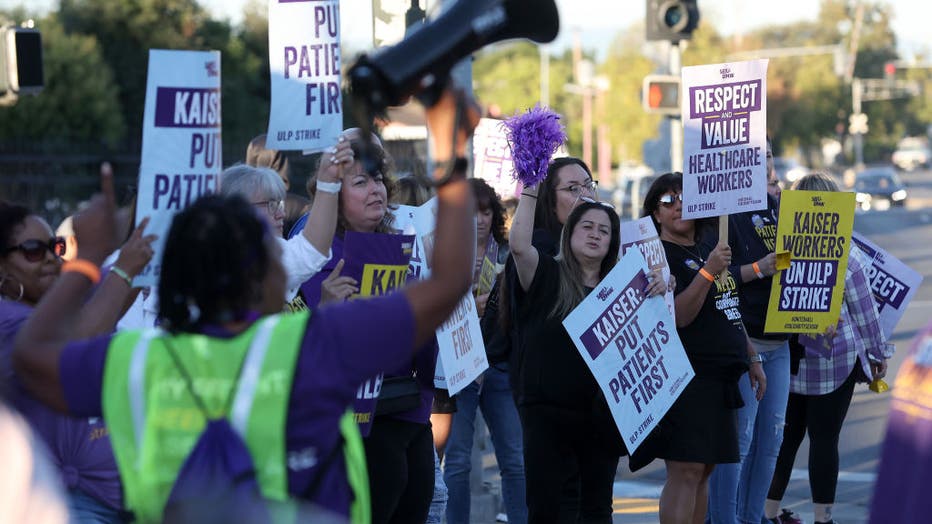Kaiser Permanente health care workers agree to new contract
PREVIOUS COVERAGE: Kaiser reaches deal with healthcare workers union
PREVIOUS COVERAGE: The union coalition has been pushing for higher wages commensurate with inflation, increased staffing and working conditions
LOS ANGELES (CNS) - Health care workers have ratified a new contract with Kaiser Permanente that union leaders say will bolster patient safety, make investments in the workforce, and set a higher standard for the health care industry nationwide, it was announced Thursday.
More than 85,000 Kaiser Permanente workers agreed to ratify a four-year contract with a 98.5% margin. The contract will be in effect until Sept. 30, 2027, at hundreds of Kaiser facilities, including those in Southern California and throughout the state.
The new contract comes after Kaiser workers walked off their jobs for a three-day strike in October. A tentative agreement was reached on Oct. 13 following meetings with acting U.S. Labor Secretary Julie Su, Kaiser and the Coalition of Kaiser Permanente Unions.
"This is more than a contract -- it signals a new day for frontline healthcare workers and for patient safety across Kaiser facilities," Angelica Mateo, a licensed vocational nurse at Kaiser Permanente Los Angeles Medical Center Clinics, said in a statement released Thursday. "When health care workers stand shoulder-to-shoulder to fight for our patients and our jobs, we can win."
The new contract improves wages, hiring and training that union leaders say will allow Kaiser Permanente to recruit and retain experienced professionals and improve patient care.
PREVIOUS COVERAGE:
- Kaiser reaches tentative deal with health care workers' union; 'Front lines folk have the answers'
- Kaiser workers end 3-day strike
Terms of the contract include:
-- Addressing the staffing crisis by raising wages by 21% over four years to better retain current health care workers.

(Getty Images)
-- Establishing a new healthcare worker minimum wage -- $25 per hour in California and $23 per hour in other states with Coalition union members.
-- Protective terms around subcontracting and outsourcing, which will keep experienced health care workers in jobs and provide strong continuity of care for patients.
-- A renewed commitment to and funding of the groundbreaking labor-management partnership where unionized frontline workers have a voice in decision-making.
-- Implementation of a joint staffing process where frontline health care workers and managers work together at the department level on proper staffing models and plans needed to deliver care to patients.
-- A one-year accelerated hiring process that decreases internal delays to external hiring and invests in internal talent to meet staffing needs. This includes the elimination of duplicative testing requirements and reducing experience barriers for incumbent employees.
"Tens of thousands of health care workers have been fighting with one goal in mind: to finally have the resources they need to keep patients safe. Today, we celebrate a huge step forward in addressing persistent staffing problems," Caroline Lucas, Executive Director of the Coalition of Kaiser Permanente Unions, said in a statement. "This new contract is not only a victory for Kaiser's patients and employees, but for all frontline health care workers and those who rely on them in our moments of need. When health care workers win, we all win."

